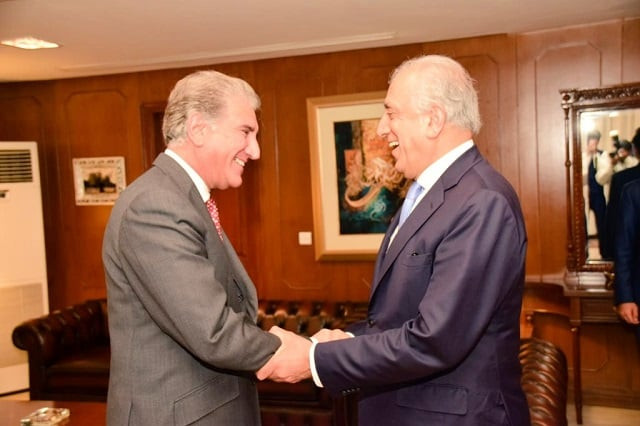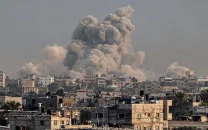Pakistan assures US of support in Afghan endgame
US Special envoy for Afghanistan meets FM Qureshi

Washington's special envoy, tasked with finding a negotiated end to Afghanistan's bloody 17-year-old war, will hold talks with Pakistani officials at the Foreign Office on the regional situation and Afghan reconciliation process. PHOTO: TWITTER/@ShahMehmoodQureshi
Washington's special envoy, tasked with finding a negotiated end to Afghanistan's bloody 17-year-old war, will hold talks with Pakistani officials at the Foreign Office on the regional situation and Afghan reconciliation process.
Khalilzad reiterated President Trump's desire to seek cooperation of Pakistan for peace and stability in Afghanistan, Foreign Office Spokesperson Dr Mohammad Faisal said in a tweet on social media.
"Peace in Afghanistan is in the best interest of Pakistan," Qureshi told the US envoy and assured continued support of the country to seek an early solution to the conflict.
Dr Faisal further tweeted that during his visit to Islamabad, the US special representative also held a meeting with Foreign Secretary Tehmina Janjua and discussed issues pertaining to peace and political settlement in Afghanistan.
Army urges foreign media to highlight improved peace, stability in Pakistan
Officials from both sides were also present during the meeting.
Meanwhile, a foreign news agency reported that some members from the Afghan Taliban's political office in Qatar were also in the federal capital.
But the visit by the Taliban leaders, which included a former Taliban ambassador and a former governor who is also on a United Nations sanctions list, is "private", the official said on condition of anonymity.
The Taliban official said, the group's Qatar office sent Shaha-ud-din Dilawar, a former ambassador to Saudi Arabia; Zia-ur-Rahman Madani, former governor of Logar province who is on the UN sanctions list for providing funding for the Taliban; Suhail Shaheen, a former diplomat and Sala Hanafi.
There was no indication who the four might meet or how long they would stay in Pakistan but it was expected their visit would be a prelude to further discussions in Qatar when Khalilzad visits later this month.
Since his appointment in September, US envoy Zalmay Khalilzad has accelerated efforts to find an Afghan peace pact that would allow for the eventual withdrawal of the United States from its longest war, which has already cost Washington nearly $1 trillion.
Khalilzad will also travel to Afghanistan, Russia, Uzbekistan, Turkmenistan, Belgium, the United Arab Emirates and Qatar in stepped-up efforts to find a peaceful end to the war.
On the eve of Khalilzad's visit to Pakistan, US President Donald Trump a wrote a letter seeking Prime Minister Imran Khan's his cooperation, even though he has been a harsh and often belligerent critic of Pakistan and even engaged in a twitter battle with Imran.
ISPR Director General Maj-Gen Asif Ghafoor told a briefing of foreign journalists on Tuesday that Pakistan's influence over the Taliban is overstated, yet he said Pakistan has repeatedly told the insurgent group to join the peace process.
He said the release of senior Taliban officials from Pakistani prisons, including a co-founder of the movement, Mullah Ghani Baradar, was part of the peace process.
Ghafoor also cautioned against a hurried US retreat from Afghanistan that leaves behind a vacuum, warning it would result in chaos.
He said a peaceful Afghanistan was in the interest of Pakistan, saying Afghanistan is one of the few countries with which Pakistan has a trade surplus.
Ghafoor also said that until 2014 the Pakistan military, which has lost more soldiers than NATO and the United States combined fighting the anti-terror war, was focused on battling its own insurgents, the banned Tehreek-e-Taliban Pakistan (TTP) and ignored demands to widen the war to include Afghan insurgents, including the Haqqani network.
Trump seeks Pakistan's support in peace talks with Afghan Taliban
But after 2014, he said the Pakistan army launched its operation in North Waziristan district to rid the area of foreign insurgents, including Afghan Taliban and Uzbek insurgents, but when they fled across the border into Afghanistan the US and Afghan forces failed to corral them.


















COMMENTS
Comments are moderated and generally will be posted if they are on-topic and not abusive.
For more information, please see our Comments FAQ